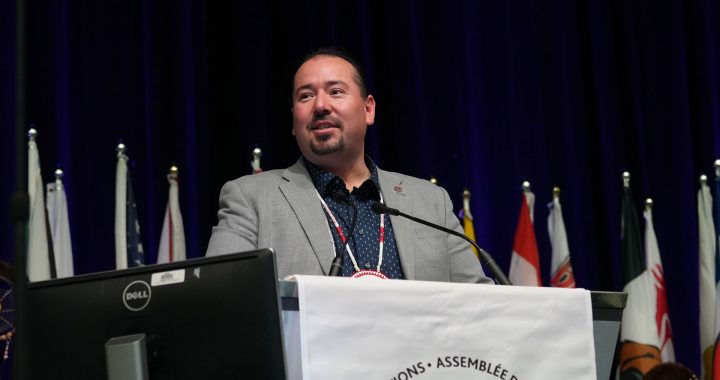After failing her first round of cultural competency training and tendering a one-line apology that her peers rejected earlier this year, Sen. Lynn Beyak apologized again and successfully completed her second round of anti-racism training, which is why the Senate ethics committee recommends she be reinstated with pay in its latest report.
One Metis elder who participated in the training called it a small but important step for the upper chamber, though he noted there remains work to do.
“What I had heard from the Senator is that she is wanting to make a change in how she sees Indigenous people,” said Norman Meade, elder in residence at University of Manitoba, who participated in two sessions.
“However, having said that, I think the Senator, like many people in positions of authority and responsibility will have difficulty ‘shaking off’ or ‘changing an attitude’ that is embedded in a governing system of colonialism for as many years as Canada is old,” he added.
“Systemic (colonial) influences spreads like an addiction, once you have it, it is hard to shake. To become healthy again, you have to have to admit you have a problem and then have the heart and will to change it.”
Meade’s comments are included in the report Jonathan Black-Branch, dean of law at University of Manitoba, submitted to Senate Ethics Officer Pierre Legault.
Black-Branch designed the training specifically for Beyak after she did not complete a program administered by the Ontario Federation of Indigenous Friendship Centres.
A seven-person team delivered the 24-hour training in 10 sessions over Zoom because of the pandemic in late May.
Black-Branch concluded Beyak successfully completed the course, learned and was willing to learn, and understands every senator’s responsibilities in relation to racism. But he also pointed out that gaining knowledge is not the same as changing beliefs.
“There is a difference between knowledge and beliefs,” he reported. “There is a marked difference between behaviours and attitudes. Attitudinal change on Indigenous issues, as with cultural and social change more generally, is often slow in progress, requiring deliberate interventions and taking successive and progressive steps that are unlikely to be ascertained within one stand-alone educational unit.”
Wendy Whitecloud, another educator who administered a session about the Indian Act and the effects of residential schools, said she was “somewhat prepared for her (Beyak) to be aloof and unwilling to accept a new or different perspective” but reported the 2013 Harper appointee “seemed to be open and was willing to learn.”
“She has, at the minimum absorbed some materials. I am hopeful she has and is able to approach her task in her position in a more rounded manner,” said Whitecloud, Indigenous liaison officer at University of Manitoba.
Legault submitted these comments as part of his report to the Senate ethics committee, which in its report recommended Beyak be reinstated with pay and her suspension lifted.
Read more:
Lynn Beyak facing accusations of ‘overtly biased views’ during Indigenous racism training
Sen. Murray Sinclair chairs the ethics committee and also chaired the Truth and Reconciliation Commission, which concluded residential schools were a form of cultural genocide.
He told APTN News that Beyak had satisfied requirements for reinstatement and that education is preferable to punishment.
“Our obligation in the Senate and our obligation as Indigenous people as well is to work to bring that knowledge forward to them but to give them the responsibility of deciding what to do with it and to see what they do,” he said. “If we continue to just yell at each other, to take acts of vengeance against each other then there will be no reconciliation.”
Beyak accepted Black-Branch’s report in her letter to Legault, calling it “thoughtful, fair, comprehensive, and accurate.”
Legault called Black-Branch’s performance assessment, “thorough, comprehensive and indisputable.”
Beyak was suspended from Senate duties in May 2019 and kicked out of the Conservative caucus for not removing racist letters about Indigenous people from her website.
The ethics committee recommended she take the letters down, undertake cultural competency training and apologize. It upheld the suspension in February 2020 after she did not complete the training and delivered a brisk apology that mentioned neither Indigenous people nor the letters.
On June 5, Beyak submitted her second apology letter to the Senate, this one much longer than the first.
She acknowledged posting letters with “hurtful comments” was “wrong and ill-considered” and that leaving them up was also wrong. She did not say the contents were racist.
“I further acknowledge that posting the letters caused pain and hurt to Indigenous people, and adversely impacted my Senate colleagues and the institution of the Senate,” she said.
“I want to apologize directly and sincerely to Indigenous peoples, to the Senate and to my fellow Senators, and to the Canadians we all represent for the hurt I have caused.”
Beyak’s peers in the Senate will have to decide if this apology suffices and vote on whether or not to reinstate her.
Sinclair said the apology letter should be taken with a grain of salt.
“Apology letters are always something you need to take with a grain of salt because sometimes they take a lot of effort by a lot of people to put together properly,” he said. “I thought the letter of apology itself was well worded. Of course, it was quite articulate and it seems sincere.”
APTN contacted Beyak at her Senate email for comment but was not able to reach her.










